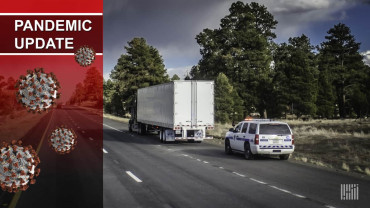Roadside Enforcement Could Decline as COVID-19 Picks Up

New federal guidelines acknowledge that social distancing measures are affecting how state police interact with trucks on the road — and that will likely result in a decline in enforcement, according to experts.
The Federal Motor Carrier Safety Administration (FMCSA) issued an FAQ on Wednesday based on concerns from state agencies about the effect that changes in how they conduct roadside inspections as a result of COVID-19 may have on their eligibility for funding under the Motor Carrier Safety Assistance Program (MCSAP). MCSAP provides grant money to support commercial vehicle safety enforcement in each state.
Responding to questions about whether police officers can waive roadside inspections as part of a traffic enforcement stop and instead just issue warnings or citations if there is a violation, the FMCSA advised states to follow their commercial vehicle safety plan (CVSP) as much as possible.
“However, the FMCSA recognizes that the number and type of inspections that the state is able to conduct may be affected by the COVID-19 outbreak and by efforts to reduce the risk of potential in-person exposure,” the agency stated.
“If a state is unable to meet the ‘CMV [commercial motor vehicle] with an inspection’ objective within the state’s CVSP traffic enforcement section due to COVID-19 impact, documentation on non-inspection traffic enforcement should still be maintained and reported to the FMCSA Division Office.” FMCSA added that it is not requiring drivers to carry copies of its Expanded Emergency Declaration in the cab.
“State enforcement agencies are communicating that, with social distancing, their world has been turned upside down like everyone else’s, which means they can’t do the job the way they have in the past,” David Osiecki, president and CEO of Scopelitis Transportation Consulting, told FreightWaves. “This tells me that, in the current environment, drivers pulled over for a potential traffic violation may start seeing less walk-around inspections, fewer requests for ELD records, and fewer requests to hand over CDLs or medical credentials to inspectors.”
State enforcement agencies also inquired whether, because letters notifying carriers that a vehicle registration has been revoked is a manual process and is therefore affected by staff reductions, they can revoke registrations without notifying the carrier by letter.
“When reasonable, states should provide some form of notice to carriers or the general public of this change in procedure,” the agency responded. It said it is also aware that some states may be unable to process registration suspensions for out-of-service (OOS) carriers due to requirements that carriers be given time to address an OOS suspension before action can be taken against their registration.
“If a state is unable to process registration suspensions for OOS carriers, then the state must notify its FMCSA Division Office as soon as possible,” FMCSA stated. “The continued operation of unsafe carriers poses a direct threat to public safety, and the FMCSA encourages States to continue processing vehicle registration suspensions for OOS carriers for as long as possible during the COVID-19 outbreak.”
Osiecki also pointed out that carriers should expect the trend toward off-site safety audits to increase. The FMCSA confirmed in its FAQ that MCSAP personnel working remotely generally are still eligible for reimbursement if those activities are supported under the state’s CVSP.
“Instead of a knock on the door, a carrier is going to get an email or phone call,” Osiecki said, noting that a federal program for off-site audits had already been rolled out in all 50 states in 2019. “The number of off-site audits was already going up, and it’s going to increase because it’s a more efficient auditing process, and the coronavirus emergency is going to expedite the use of that process.”
